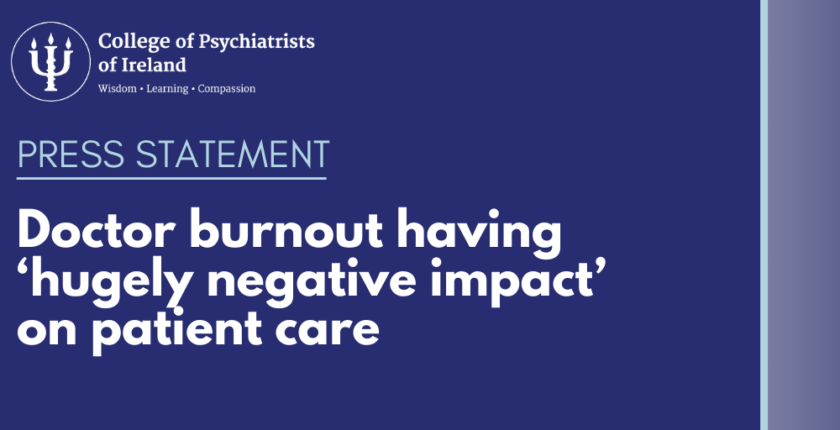Blog
Press Statement: Doctor burnout having ‘hugely negative impact’ on patient care
- October 2, 2023
- Posted by: ICP
- Category: Blog College in the media EAP Activities External Affairs & Policy Government Policy Media Press Statements

The College of Psychiatrists of Ireland has warned that soaring rates of doctor burnout and stress are having a “hugely negative impact” on patient care in Ireland.
Radical plans for both doctor recruitment and doctor retention in mental health services and a significant increase in mental health spending are needed as urgent priorities to ease the pressure on overworked medical professionals in our mental health services and, as a result, improve patient outcomes.
Findings from several recent studies conducted among doctors, including those specialising in psychiatry, included:
- Nearly half (46%) of all doctors experience occupational stress (versus 23% of the general population)
- One in three psychiatrist specialist doctors experience burnout
- One in ten experience severe depression, anxiety and stress
- One in five feel they do not have enough time for family/personal life
- Four in five feel effort exceeds non-financial rewards gained
Speaking today, Dr Lorcan Martin, President of the College of Psychiatrists of Ireland and a consultant in general adult psychiatry, said:
“Mental health services in Ireland have been hollowed out over the course of decades now, and the concerning and depressing result is a system with far too few psychiatrists treating an ever-increasing cohort of patients with mental illness. Doctors working in the services are hugely over-worked and chronically under-resourced.”
“This is ironically having a hugely negative impact on the wellbeing and mental health of psychiatrists, and the ultimate losers are patients who simply cannot expect to receive the very best care if the doctors who treat and support them cannot cope with the demands that are being placed on them.”
Dr Martin said that a radical national plan to implement the accepted official doctor workforce planning, recruitment and retention documents for mental health services was urgently needed: “Irish doctors, including psychiatrists, are understandably opting to leave Ireland in their droves to countries which offer them far better working conditions and work-life balance. The Government and the HSE cannot sit idly by and watch them leave. It needs to present an implementation plan to retain our specialist (consultant) psychiatrists and doctors training to be psychiatrists. That means wide-ranging reform of our mental health services – including investment, capacity and doctor numbers. Furthermore, we need to attract the doctors of tomorrow into our health system, and that doesn’t happen by accident.”
Dr Martin said that for every €20 of funding in the health system, just €1 went into mental health. This needs to double at the very least (to €2 billion) to bring us into line with mental health services of comparable countries such as France, England and Scotland. He added that current funding for training doctors to be specialists in psychiatry is circa €600,000 short of what is needed.
“The forthcoming Budget, to be announced on World Mental Health Day, gives us yet another opportunity to address the scandalous shortfalls and corresponding systemic issues in our services. We must produce a plan to reduce burnout and the myriad inequitable pressures on psychiatrists that are beyond the scope of their intended roles as specialist doctors, as they need to be at their best in order to give optimal care to patients. Anything less is inexcusable and unacceptable.
“We have multiple reports, investigations, plans and recommendations for the services but none is valuable without the political will to fund and prioritise the mental health of the nation.”
He added that there were only approximately 400 consultant psychiatrist approved posts filled on a permanent basis in Ireland when there should be a minimum of 647 approved posts filled by this year, with the total number increasing every year to achieve the accepted 835 specialist posts by 2030.
“The College calls on the Government and the HSE to develop, fund and implement national clear recruitment and retention plans based on official accepted research, projections and need. We need to make Ireland’s mental health services the most attractive place to attend and work instead of accepting competition internationally as a permanent hurdle.”
For queries contact:
Karen McCourt
Communications and Policy Officer
